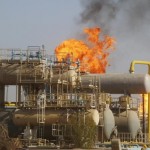Gulf economies edge toward reform as oil price slides

When Kuwait’s government said last month that it planned to raise domestic prices of diesel fuel and kerosene, some angry Kuwaitis took to Twitter to denounce the move as unfair.
The austerity measures are small compared to the tens of billions of dollars of oil wealth which the Gulf monarchies are spending on welfare to buy social peace in the wake of the 2011 Arab Spring uprisings.
In some cases, officials do not appear to be economizing because they are running out of money — they are simply using the oil price slide as a political argument to persuade their citizens of the need for reforms.
Last month, Oman’s Financial Affairs Minister Darwish Al-Balushi told Reuters that his government was likely to start cutting some state subsidies next year, and that the oil price slide had made public opinion more supportive of this.
“I think the people would be more understanding now, more accepting. They realize that this was natural wealth that is being overused, wasted…” Balushi said.
The oil price slide has not left Kuwait close to running out of money; the IMF has estimated it needs an oil price of only $54 to balance the state budget, far below Brent crude oil’s current price of around $85.
The country’s ruler, Emir Sheikh Sabah Al-Ahmed Al-Sabah, cited cheaper oil last week when he told parliament that it should cooperate with the cabinet to “protect our oil and financial wealth, which is not only ours, but is also the right of future generations”.
The cabinet has not yet announced any date for a hike in diesel and kerosene prices, but in a report earlier this year, state news agency KUNA estimated diesel price reform would save the government around $1 billion a year.
Oil Minister Ali Al-Omair last month ruled out raising petrol and cooking gas prices for now, but officials have been discussing higher electricity and water tariffs.
“Reducing energy subsidies is always a difficult subject for all Gulf economies,” said John Sfakianakis, director for the region at investment manager Ashmore in Riyadh. “But over the long run it will benefit the wider economy, as subsidies are a structural price distortion and an opportunity cost on state budgets.”
Source: arabnews- Gulf economies edge toward reform as oil price slides





























